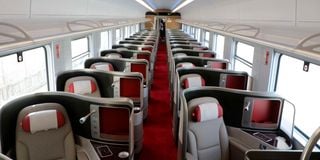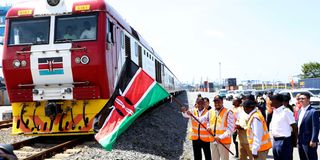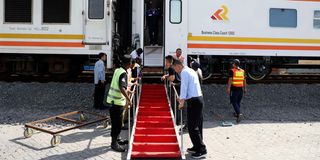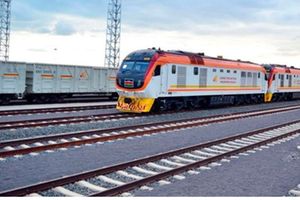
Inside the newly acquired Premium Class Standard Gauge Railway (SGR) coaches.
Kenya Railways has clarified that the newly introduced premium class coaches on its standard gauge railway (SGR) passenger trains, set to operate between Nairobi and Mombasa, will charge a lot more because they offer extra comfort and services for middle-class travellers.
The State-owned firm also revealed that the premium service coaches will be launched in the next two weeks at Sh12,000 for adults travelling one-way and Sh6,000 for children aged between 3-11 years.
The new service, which will cost Sh20,000 for a return ticket, is expected to improve passenger experience between the two destinations.
The premium class carriages, Kenya Railways said, will give passengers access to some extras including more space and entertainment options.
Additionally, the coaches feature extra storage options for travellers with additional baggage, designated shoe storage space, automated window shutters and seats that can rotate to face any direction.

Transport Principal Secretary Mohamed Daghar with other government Officials during the flag off of the newly acquired Premium Class SGR coaches in Mombasa on July 22, 2024.
On meals, travellers using the premium class coaches in the morning will be entitled to full breakfast and lunch. Those travelling in the evening will have dinner on the train while refreshments will be served throughout their journey on the coaches.
“The service targets middle-class passengers who are going in either direction for leisure. We are not competing with airlines,” said KR while responding to Nation’s queries.
Introduction of the premium class service comes less than seven months after Kenya Railways adjusted passenger fares on Madaraka Express trains plying the two cities. The adjustments, which took effect in January this year, saw passengers pay Sh4,500 on first-class coaches from Sh3,000 -- an increase of about 50 percent.

The newly acquired Premium Class Standard Gauge Railway (SGR) coaches during the flag off ceremony Port Rietz Freight Station in Mombasa on July 22, 2024.
Economy class coaches were priced at Sh1,500 from Sh1,000.
Kenya tapped over half a trillion shillings from Chinese lenders to fund the construction of the SGR from Mombasa to Naivasha.
Taxpayers have been forced to shoulder the burden of SGR loans because revenues generated from passenger and cargo services on the track` are not enough to meet operational costs, which stood at Sh18.5 billion in the year to June 2022, against sales of Sh15 billion.









